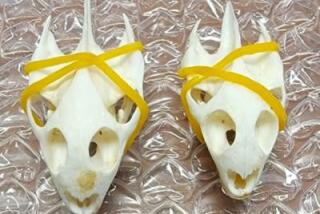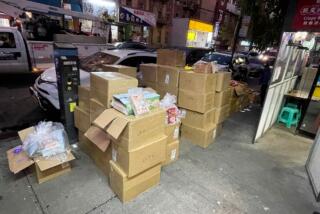Two indicted in tortoise smuggling
- Share via
The overnight delivery packages that arrived with regularity from Asia at the Spanish-style home in suburban Diamond Bar were labeled “toys” and “action figures.”
But inside, authorities said, crawled rare, endangered tortoises illegally plucked from native habitats across Asia, including India.
From Diamond Bar, at least 75 tortoises -- along with some rare monitor lizards -- were sold to exotic pet collectors across the country, with some of the rarest reptiles fetching thousands of dollars each.
On Thursday, authoritiesindicted two of the alleged ringleaders of the operation, capping a four-year investigation by the U.S. Fish and Wildlife Service. Authorities called the case a particularly egregious example of what is a growing black market of exotic reptiles.
“We’ve had snakes come into Chicago and smuggling cases involving turtles and iguanas,” said Scott Flaherty, with the California office of the Fish and Wildlife Service. “But it’s worldwide.”
Wai Ho Gin, a.k.a. “Bobby Gin,” faces more than a dozen charges of smuggling, conspiracy and money laundering.
Umesh Kishore Tekani, a.k.a. “Mexx,” faces the same charges but is believed to be in Singapore, the hub for transporting the tortoises into the U.S.
The pair are among six people charged so far, including wealthy customers from Southern California to the East Coast, who allegedly bought tortoises.
The smuggled species included Burmese, Indian star, pancake and radiated tortoises as well as green tree monitors.
Tortoises, whose importation is prohibited under the Endangered Species Act, are popular for their colorful shells and distinctive shapes.
The Indian stars, for example, are known for their bright sunburst-like shells. The radiated tortoises have a shell with multiple humps and detailed patterns.
In addition to being purchased as pets, some are also used for their purported medicinal benefits or as jewelry.
Federal authorities say they have e-mail correspondence dating from August 2002 in which Tekani allegedly offered to sell and ship tortoises to Gin in Diamond Bar.
In a 33-page affidavit, federal authorities detailed how Tekani allegedly packaged the reptiles to look like toy shipments.
One shipment had a layer of toy action figures on top of newspapers, prosecutors said.
Below it were 51 live Indian star tortoises packed three to each of 17 plastic containers.
Federal investigators said they also linked Gin to ads for Burmese and Indian star tortoises placed on the website www.kingsnake.com.
When undercover investigators contacted him by phone in 2003, agents allege he told them he had “seven female star tortoises left at $350 each.”
Gin also said there were other breeds available that he “bred and raised ... at his house,” the government alleged.
The agent eventually paid $600 for two of the tortoises.
The government also gathered evidence linking the shipments to Tekani.
Anthony Eaglin, Gin’s attorney, said he was reviewing the case and wouldn’t comment on the government’s allegations “just yet.”
Also indicted in the case were David Yeh, 35, of Newport Beach; Barry Lambert, 36, of La Mesa; Ralph Hoekstra, 69; of Huntington Beach and Jody Patterson, 46, of Norfolk, Va. They have pleaded guilty and been sentenced to probation.
Officials said Gin and Tekani face up to five years in federal prison, if convicted.
The statutory maximum penalty for money laundering is 20 years.
Flaherty said the federal government does not keep statistics on animal smuggling or trafficking.
But during his eight years with the Fish and Wildlife Service in the Midwest, he recalled numerous illegal cases of smuggling, not only from overseas to the United States but also across state lines.
Officials for the World Wildlife Fund, however, put the black market in exotic animals -- including snakes, lizards, turtles and birds -- in the billions, with profit margins that can be larger than drug dealing.
Other smuggling rings have been busted in San Francisco, London and East Coast cities.
andrew.blankstein @latimes.com
More to Read
Sign up for Essential California
The most important California stories and recommendations in your inbox every morning.
You may occasionally receive promotional content from the Los Angeles Times.










